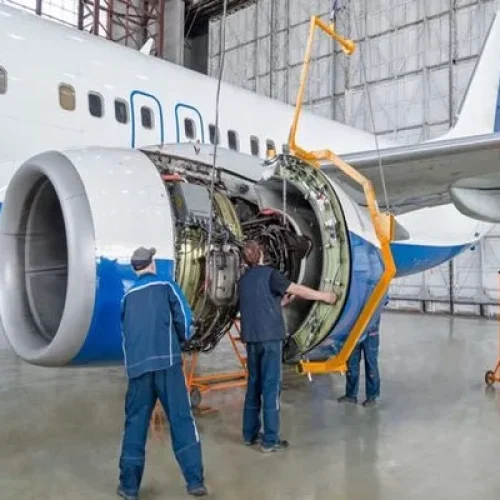Georgian University

University Program in Aeronautical Engineering
Program Overview
The Bachelor of Science in Aeronautical Engineering (B.Sc. Aeronautical Engineering) program is designed to provide students with a comprehensive understanding of the principles and technologies involved in the design, analysis, and operation of aircraft and aerospace systems. The curriculum integrates core engineering concepts, specialized aeronautical subjects, and hands-on laboratory experiences to prepare graduates for careers in the aerospace industry, research and development, and aviation management.
Program Structure
Year 1: Foundation in Engineering and Basic Sciences
Semester 1: Introduction to Engineering and Sciences
- Introduction to Aeronautical Engineering
- Engineering Mathematics I (Calculus and Linear Algebra)
- Physics for Engineers I (Mechanics and Thermodynamics)
- Engineering Drawing and CAD
- Computer Programming for Engineers (Python or C++)
Semester 2: Basic Engineering Sciences and Mechanics
- Engineering Mathematics II (Differential Equations and Statistics)
- Physics for Engineers II (Electricity and Magnetism)
- Mechanics of Materials I (Statics)
- Chemistry for Engineers
- Introduction to Flight and Aircraft Systems
Year 2: Core Aeronautical Engineering Concepts
Semester 3: Aerodynamics and Flight Mechanics
- Fluid Mechanics
- Engineering Mathematics III (Vector Calculus and Complex Variables)
- Aerodynamics I (Incompressible Flow)
- Mechanics of Materials II (Dynamics)
- Electrical Engineering and Circuits
Semester 4: Aircraft Structures and Propulsion
- Aircraft Structures I (Stress Analysis and Materials)
- Aerodynamics II (Compressible Flow)
- Thermodynamics and Heat Transfer
- Propulsion Systems I (Jet and Rocket Engines)
- Control Systems Engineering
Year 3: Advanced Aeronautical Engineering Topics
Semester 5: Aircraft Design and Avionics
- Aircraft Performance and Stability
- Aircraft Structures II (Advanced Structural Analysis)
- Propulsion Systems II (Turbine Engines)
- Avionics and Instrumentation Systems
- Engineering Mathematics IV (Numerical Methods)
Semester 6: Flight Dynamics and Aircraft Systems
- Flight Dynamics and Control
- Aerospace Materials and Manufacturing Processes
- Computational Fluid Dynamics (CFD)
- Aircraft Systems Engineering (Hydraulics, Fuel, and Environmental Control Systems)
- Elective Course I (e.g., Helicopter Aerodynamics, Spacecraft Systems)
Year 4: Specialization, Capstone Project, and Professional Development
Semester 7: Advanced Topics and Capstone Project
- Advanced Aerodynamics (Transonic and Supersonic Flow)
- Finite Element Analysis for Aerospace Applications
- Aerospace Vehicle Design I (Conceptual Design)
- Research Methods and Aerospace Engineering Practices
- Capstone Project I (Proposal and Preliminary Design)
Semester 8: Capstone Project and Internship
- Aerospace Vehicle Design II (Detailed Design and Analysis)
- Capstone Project II (Implementation and Testing)
- Internship in Aeronautical Engineering (Industry Placement)
- Professional Ethics and Aerospace Regulations
- Elective Course II (e.g., Unmanned Aerial Vehicles, Hypersonic Aerodynamics)
Program Learning Outcomes
Upon completion of the program, graduates will be able to:
- Demonstrate a solid understanding of aeronautical engineering principles, including aerodynamics, flight mechanics, propulsion, and aircraft structures.
- Apply advanced mathematical and scientific concepts to the analysis and design of aerospace systems.
- Design, develop, and test aerospace components and systems using modern engineering tools and techniques.
- Conduct experiments, analyze data, and interpret results in the context of aeronautical engineering.
- Understand the impact of aerospace engineering solutions in a global and societal context, considering safety, environmental, and regulatory aspects.
- Communicate effectively in technical and professional environments, both in written and oral forms.
- Demonstrate a commitment to professional ethics, safety standards, and lifelong learning.
- Work effectively in multidisciplinary teams to solve complex engineering problems.
Assessment Methods
- Written Examinations (Multiple Choice Questions, Short Answer Questions, Problem Solving)
- Laboratory Experiments and Reports
- Design Projects and Presentations
- Computational Simulations and Analysis
- Research Papers and Case Studies
- Capstone Project and Thesis Defense
- Internship Evaluations and Reflective Journals
- Group Projects and Peer Assessments
Internship and Practical Experience
- Internship: In the final year, students are required to complete a supervised internship in a professional setting such as aerospace companies, research institutions, or aviation authorities. This practical experience is crucial for applying theoretical knowledge to real-world situations, developing professional skills, and preparing for employment in the aerospace industry.
Elective Options
Students can choose from various electives to specialize in specific areas of aeronautical engineering, such as:
- Advanced Propulsion Systems
- Spacecraft Systems Engineering
- Helicopter Aerodynamics and Design
- Unmanned Aerial Vehicles (UAVs)
- Advanced Aircraft Design and Optimization
- Hypersonic Aerodynamics
- Air Traffic Management and Aviation Operations
- Aerospace Robotics and Control
Admission Requirements
- High school diploma with a strong background in mathematics and physics.
- Competitive entrance examination scores (where applicable).
- Personal statement outlining interest in aeronautical engineering.
- Letters of recommendation.
- Interview (optional, depending on university requirements).
Program Duration
- 4 Years (8 Semesters)
Degree Awarded
- Bachelor of Science in Aeronautical Engineering (B.Sc. Aeronautical Engineering)
Career Opportunities
Graduates of the B.Sc. Aeronautical Engineering program are prepared for roles in:
- Aircraft and Aerospace Design and Manufacturing
- Aerodynamics and Flight Testing
- Propulsion Systems and Engine Development
- Avionics and Aerospace Systems Engineering
- Aircraft Maintenance and Quality Assurance
- Research and Development in Aerospace Technology
- Aviation Safety and Regulatory Agencies
- Defense and Space Industries
Georgian University is proudly powered by WordPress


